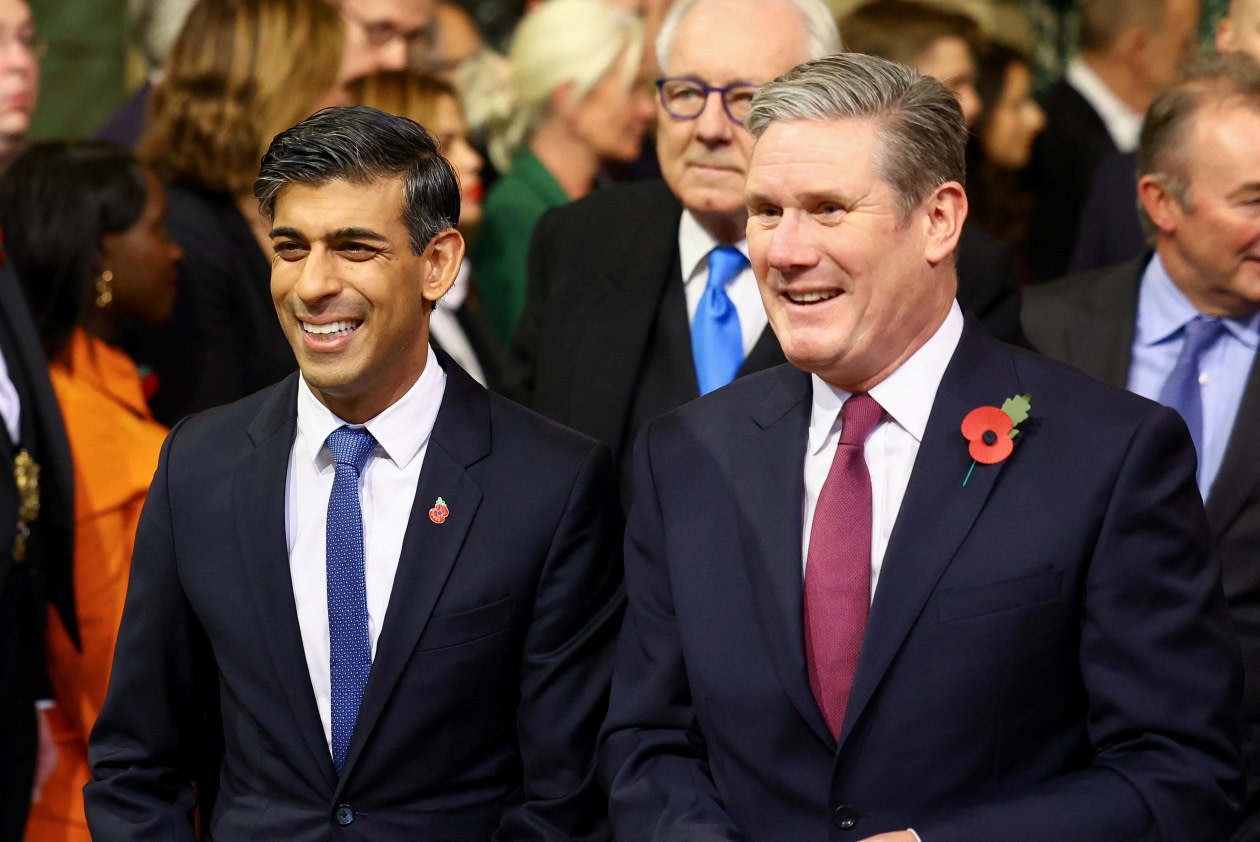Rishi Sunak will go head-to-head with Sir Keir Starmer in the first live television debate of the UK general election campaign on Tuesday, in a highly anticipated clash between the two leaders.
Sunak, whose Conservative party trails Labour by more than 20 points, badly needs to gain traction in the campaign and wants to use the debate in Manchester to highlight what he claims is Starmer’s “lack of a plan”.
But the prime minister’s team admit that Sunak, who has a YouGov net favourability rating of -48, is unlikely to turn things around in a single debate. “Nobody sees this as a game-changer moment,” said one aide.
Televised leaders’ debates are a relatively recent phenomenon in UK politics — the first took place in 2010 — and have acquired major significance.
That is partly because of the impact of the first debate when Sir Nick Clegg, then Liberal Democrat leader, introduced himself as a fresh face to the nation and triggered a shortlived polling bounce known as “Cleggmania”.
No subsequent debate has had such an impact and Sunak’s team said the prime minister’s more limited objective on Tuesday would be to plant concerns in voters’ minds about whether Starmer was up to running the country.
“It’s an important moment in the campaign — it’s the moment to expose the fact that Starmer doesn’t have a plan,” said an aide to Sunak. “It’s a moment when people can see both options on the table.”
Starmer, the frontrunner in the campaign, has so far agreed to just two head-to-head debates with Sunak, in keeping with his overall strategy of trying to minimise risk in Labour’s campaign. Sunak had wanted to hold at least half-a-dozen such debates.
Both leaders have devoted hours to preparing for the hour-long debate on Tuesday night, screened by ITV1 at 9pm, to avoid the kind of slip-ups that quickly proliferate to a wider audience on social media.
Sunak has been working with Oliver Dowden, deputy prime minister, who has been acting out the role of Starmer, to try to find a way of pinning down what he has claimed is the Labour leader’s “vague” promises.
On the other side, Tom Webb, a Labour official who plays the role of Sunak each week to prepare Starmer for prime minister’s questions, has been reprising that persona for the Labour leader’s debate practice sessions.
“Keir wants to enter this in the spirit of prosecutor interrogating Sunak for 14 years of failure, and we don’t see how he’s going to answer those questions, because there is no good answer,” said one aide.
Before entering politics in 2015, Starmer ran the UK’s Crown Prosecution Service.
“Keir will make sure he prosecutes Sunak’s role as chancellor and some of the decisions he made then, as well as his time as prime minister,” the aide added.
Labour hopes that this could push Sunak into what critics have called the prime minister’s default “tetchy” mode.
Lord Peter Mandelson, a former Labour cabinet minister, said of Starmer: “He has just got to behave like a prime minister and not be goaded.” Mandelson added that Starmer was doing well in the campaign so far, appearing “earnest, serious, credible”.
Although televised debates have been a feature of US politics since Richard Nixon and John F Kennedy went head-to-head in the 1960 presidential campaign, they took a further 50 years to arrive in Britain.
Lord Jonny Oates, who helped Clegg prepare for the 2010 debate, said that although the Lib Dem bubble burst later in the campaign, without that initial debate “we would have been squeezed out of the picture”.
Favourites during the campaign tend to shun debates wherever possible: Tory leader and prime minister Theresa May in 2017 claimed that knocking on doors was a more valuable use of her time.
Paul Harrison, one of May’s advisers at the time, said: “In 2017 we started with a big notional lead. Anything that can cause an erosion of that lead is a danger.” May’s campaign for Number 10 crashed in any event and her majority was reduced rather than improved.
Boris Johnson, Tory leader at the 2019 election, was kept on a tight leash by his advisers and refused to take part in a Channel 4 leaders debate on the environment. The broadcaster replaced him with a melting block of ice.
Lee Cain, founding partner at Charlesbye Strategy and an adviser to Johnson at the time, said that when the Tory leader did take part in debates, he was drilled to deliver key messages such as “Get Brexit Done”, contrasting that with then-Labour leader Jeremy Corbyn’s “dither and delay”.
“The most important thing for a candidate to remember is that the debate is not a debate,” he said. “It is an opportunity to drive a message and frame the choice positively to millions of voters.”
“Most of the time people are simply not thinking about politics,” he said. “A TV debate is one of those rare occasions when people pay attention.”
Television networks have set out plans for a series of debates, but so far Sunak and Starmer have only agreed to do head-to-head events for ITV on Tuesday and for the BBC in Nottingham on June 26.
This article was written by Jim Pickard and George Parker from The Financial Times and was legally licensed through the DiveMarketplace by Industry Dive. Please direct all licensing questions to legal@industrydive.com.
Image: WPA Pool / Pool via Getty

